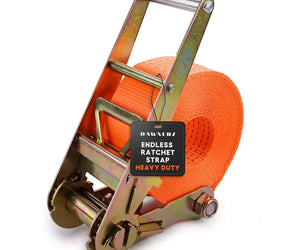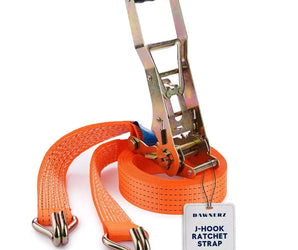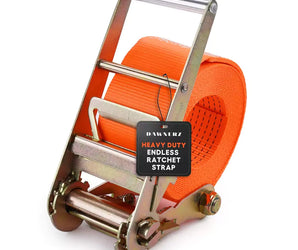

Technical Content Reviewed and Fact-Checked by Andy Webb, Operations & Safety Director
Tow Strap vs Recovery Strap: What’s the Difference?
Tow straps are made from polyester and have minimal stretch (3–5%), making them ideal for controlled towing and recovery.
Recovery straps use nylon with high stretch (15–20%) for dynamic snatch recovery.
Both can recover stuck vehicles — but the key difference is technique, not capability.
Attribute |
Tow Strap (Polyester) |
Recovery Strap (Nylon) |
Material |
Maintains 100% strength when wet |
Can lose up to 30% strength when wet |
Stretch |
Minimal (3–5%) |
High (15–20%) |
Primary Use |
Controlled recovery and towing operations |
Dynamic recovery ("snatch recovery") |
Recovery Method |
Gradual, steady pulling with calculated force application |
Shock-loaded kinetic pulling using vehicle momentum |
Weather Suitability |
Excellent in wet/muddy conditions |
Weaker performance in wet environments |
Risk of Equipment Damage |
Very low when used with proper technique |
Higher — during recoveries with varied resistances |
Common Misconception |
"Only for towing" |
"Always best for recovery" |
Best For |
Heavy equipment, mining, construction |
Light vehicles, off-road recovery, |
What Is a Tow Strap?
A tow strap is constructed from polyester webbing with minimal stretch characteristics (approximately 3-5% elongation under load).These straps feature reinforced end loops and are rated with specific Working Load Limits (WLL) and break strengths.
Traditional automotive advice suggests tow straps should only be used for moving free-rolling vehicles - but this limitation is based on theory, not practical heavy-duty application.
Crucially, polyester is waterproof and maintains 100% of its Working Load Limit when wet. This is a critical advantage since most heavy equipment recoveries occur in cold, wet conditions rather than ideal summer weather.
What Is a Recovery Strap?
A recovery strap is manufactured from nylon webbing with significantly greater elasticity (typically 15-20% elongation under load). This stretch allows the strap to store and release kinetic energy during dynamic "snatch recovery" operations where momentum assists in freeing stuck vehicles.
However, nylon has a critical weakness: it can lose up to 30% of its tensile strength when wet. Since most heavy equipment recoveries happen in challenging weather conditions, this strength reduction creates a serious safety concern when the strap is needed most.
What Is Snatch Recovery?
Snatch recovery, also known as kinetic recovery, involves using the momentum of a moving recovery vehicle combined with an elastic strap to generate pulling forces through sudden shock loading. The technique requires the recovery vehicle to accelerate away from the stuck vehicle until the strap becomes taut, at which point stored kinetic energy transfers to assist in extraction.
While snatch recovery may extract vehicles faster than controlled methods, it subjects heavy equipment to instantaneous stress loads that can exceed manufacturer design parameters. For heavy mining trucks, excavators, and construction equipment, these forces can damage hydraulic cylinders, crack chassis welds, misalign tracks, or destroy sensitive electronic systems.
Many mining sites, construction projects, and heavy equipment operators have begun implementing policies restricting or banning kinetic recovery methods due to the frequency and severity of resulting damage claims.

Tow Straps
Low-stretch polyester for controlled, gradual recovery. Maintains full strength when wet — ideal for mining, construction, and heavy equipment.

Recovery Straps
High-stretch nylon absorbs kinetic energy for snatch-style pulls. Suited for off-road vehicle recovery, not heavy machinery.

Snatch Recovery
A dynamic method using momentum. Fast but risky — increases stress on hydraulics, electronics, and structural systems.
The Critical Misconceptions Exposed
Misconception 1: Material Determines Application
The industrial equipment sector has inherited automotive-based myths that polyester equals "towing only" while nylon equals "recovery capable." This oversimplification ignores fundamental engineering principles where proper load calculation, adequate power reserves, and controlled force application determine successful outcomes.
In heavy-duty applications, material selection should prioritize predictability and strength retention under sustained loads - characteristics where polyester excels over nylon's variable stretch properties.
Misconception 2: Faster Recovery Equals Better Results
The "time is money" mindset has driven dangerous shortcuts in heavy equipment recovery. While saving 10-15 minutes with kinetic recovery might seem attractive, the resulting damage can lead to 3-5 days of repairs and maintenance, plus significant costs in lost productivity.
Modern heavy equipment integrates sophisticated systems never designed to handle kinetic recovery forces: precision hydraulic cylinders, electronic control modules, GPS and guidance systems, emission control systems, and transmission systems calibrated for specific operating parameters.
Misconception 3: Heavy Equipment Can Handle Dynamic Loading
This misconception fails to account for the complexity and sensitivity of modern heavy machinery. Unlike simple mechanical equipment of previous decades, today's heavy equipment contains numerous electronic systems, sensors, and precision components that can be damaged by sudden shock loading even when the main structure appears unaffected.
Real-World Military Experience: 20 Years of Controlled Recovery Operations
During 20 years of military service specializing in amphibious vehicle recovery operations, extensive experience was gained with heavy equipment extraction in the most challenging conditions. These operations involved recovering vehicles weighing 10-40 tons stuck in deep sand, both dry and saturated, often with axles completely buried and vehicles at precarious angles.
The Evolution to Controlled Recovery
Prior to this service period, military operations had utilized recovery straps and kinetic recovery methods. However, the military had transitioned to using polyester tow straps exclusively for vehicle recovery operations. This change was driven by documented evidence that controlled recovery methods produced superior results with significantly less equipment damage.
The Equipment and Conditions
Military amphibious vehicle recovery presented unique challenges involving heavy, complex vehicles in harsh environments. These vehicles contained sophisticated navigation equipment, communication systems, weapons electronics, and precision drive components - all potentially vulnerable to shock loading damage from dynamic recovery methods.
Recovery operations took place in challenging conditions including salt water environments, deep sand infiltration, and extreme temperature variations, requiring recovery methods that could operate reliably without causing additional stress to already compromised vehicles.
Standard Operating Procedures: Why We Used Tow Straps
Throughout these 20 years of operations, polyester tow straps with controlled recovery techniques were exclusively employed. This methodology was based on proven protocols that consistently delivered successful results while minimizing equipment damage.
The approach centered on three fundamental principles:
1. Adequate Recovery Vehicle Power Recovery vehicles were selected to provide significant power reserves beyond calculated resistance forces. For vehicles stuck in challenging conditions like wet sand, recovery vehicles with substantial overcapacity were employed to ensure smooth, controlled pulling without straining equipment.
2. Proper Working Load Limits Polyester tow straps were selected with conservative Working Load Limit ratings maintaining appropriate safety factors under maximum anticipated loads. This approach ensured strap integrity throughout extended recovery operations.
3. Controlled Steady Pull Technique Force application followed strict protocols emphasizing gradual engagement, constant communication, continuous monitoring of strap condition, and immediate cessation if any irregularities appeared. Recovery operations prioritized equipment preservation over speed.
The Documented Results
Within 24 months of implementing standardized controlled recovery protocols using polyester tow straps, military operations documented a 50% reduction in damage to recovered vehicles. This dramatic improvement represented a significant advancement in operational efficiency and equipment preservation.
The success of this approach was so substantial that these protocols became standard practice and influenced recovery operations across multiple installations. The data clearly demonstrated that controlled recovery methods delivered superior long-term results compared to dynamic techniques.
Why Dynamic Recovery Risks Heavy Equipment Damage
Modern heavy equipment represents sophisticated engineering with tolerances and specifications that dynamic recovery can compromise that aren't immediately apparent.
The Controlled Recovery Advantage
Professional heavy equipment recovery using properly rated polyester tow straps offers measurable advantages over dynamic methods:
Predictable Force Application
Polyester's minimal stretch provides controlled force curves that remain within equipment design parameters. Recovery operators can calculate and maintain safe stress levels throughout the operation, reducing the risk of exceeding manufacturer specifications.
Enhanced Safety Protocols
Controlled recovery enables implementation of comprehensive safety measures including personnel exclusion zones, communication protocols, equipment monitoring, and emergency procedures. The methodical approach allows for proper risk assessment and mitigation throughout the recovery process.
Equipment Preservation
Systematic controlled recovery protects both stuck and recovery vehicles from damage that could create additional safety hazards or operational complications. This approach maintains equipment reliability and extends operational lifespan.
Documentation and Process Improvement
Controlled recovery methods allow proper documentation of conditions, techniques, and results, enabling continuous improvement of recovery procedures and training programs.
Industry Response to Recovery Method Concerns
The heavy equipment industry has increasingly recognized the potential risks associated with dynamic recovery methods. Many operations have implemented policies requiring controlled recovery techniques for valuable equipment, particularly in applications where precision and reliability are critical.
Mining operations, construction projects, and industrial facilities often specify controlled recovery methods in their safety protocols and equipment handling procedures. This trend reflects growing awareness of the hidden costs associated with dynamic recovery and the long-term benefits of controlled techniques.
Professional Recovery Protocol for Heavy Equipment
Successful heavy equipment recovery requires a systematic approach prioritizing safety and equipment preservation:
Economic Reality: Investment vs. Risk
The additional time required for proper controlled recovery represents minimal cost compared to potential equipment damage, downtime, and repair expenses. When heavy equipment values range from hundreds of thousands to millions of dollars, the conservative approach of controlled recovery provides excellent return on investment through equipment preservation and operational continuity.
Safety: The Foundation of Professional Recovery
Heavy equipment recovery involves massive forces and expensive machinery where safety cannot be compromised. Controlled recovery methods allow proper implementation of safety protocols that protect both personnel and equipment while maintaining operational standards.
The predictable nature of controlled recovery enables comprehensive risk management, proper personnel positioning, and emergency response capabilities that dynamic methods cannot accommodate due to their unpredictable force characteristics.
Learn more about safe recovery practices in the Dawnerz Safety Center
Ready to Implement Professional-Grade Recovery Standards?
When your operation demands the highest standards of safety, reliability, and equipment protection, don't compromise with inferior recovery solutions. Dawnerz industrial-grade polyester tow straps are designed to military specifications and tested under the most demanding field conditions.
Our tow straps deliver the predictable performance and unwavering strength retention that controlled recovery operations require. Built with waterproof polyester that maintains 100% Working Load Limit in wet conditions, every Dawnerz strap represents the difference between successful recovery and costly equipment damage.
Ready to Eliminate Downtime and Minimize Risk?
In high-stakes environments, recovery equipment isn’t just gear — it’s insurance for your uptime, your team, and your bottom line. Dawnerz heavy-duty tow straps are engineered to outperform under pressure, delivering consistent strength, safety, and reliability in the world’s harshest recovery conditions.
Don’t let avoidable equipment damage derail your operation. Equip your team with the recovery solution trusted by professionals who can’t afford failure.
Contact us today and build a recovery protocol you can stake your reputation on.
Frequently Asked Questions
What is the main difference between tow strap and recovery strap materials?
The key material difference lies in their construction and water resistance. Tow straps are made from polyester, which is waterproof and maintains 100% of its Working Load Limit when wet. Recovery straps are made from nylon, which can lose up to 30% of its tensile strength when wet. Since most heavy equipment recoveries happen in challenging weather conditions, this strength reduction creates a serious safety concern when the strap is needed most. Polyester also has minimal stretch (3-5% elongation), while nylon has high elasticity (15-20% elongation under load).
Can you use a tow strap for recovery operations, or is it only for towing?
Yes, tow straps can absolutely be used for recovery operations. The widespread belief that polyester straps are "towing only" while nylon straps are "recovery only" is a marketing misconception. Both materials can perform recovery operations when used with proper technique and adequate power. The difference isn't capability - it's technique. Tow straps use controlled steady pulling methods, while recovery straps are designed for dynamic "snatch" recovery. For heavy equipment, controlled recovery using tow straps often provides better results with less risk of damage.
What is snatch recovery and why might it damage heavy equipment?
Snatch recovery (also called kinetic recovery) involves using the momentum of a moving recovery vehicle combined with an elastic strap to generate pulling forces through sudden shock loading. The recovery vehicle accelerates until the strap becomes taut, transferring stored kinetic energy to assist extraction. However, this subjects heavy equipment to instantaneous stress loads that can exceed manufacturer design parameters. Modern heavy equipment contains sophisticated electronic systems, precision hydraulic components, and sensitive sensors that can be damaged by sudden shock loading, even when the main structure appears unaffected.
What are the advantages of controlled recovery over dynamic recovery methods?
Controlled recovery using properly rated polyester tow straps offers several key advantages: predictable force application that stays within equipment design parameters, enhanced safety protocols with proper risk assessment, equipment preservation that protects both stuck and recovery vehicles, and documentation capabilities for process improvement. Military operations documented a 50% reduction in vehicle damage within 24 months of implementing controlled recovery protocols. While dynamic recovery might save 10-15 minutes, the resulting damage can lead to 3-5 days of repairs and significant costs in lost productivity.
How do you properly select between a tow strap and recovery strap for heavy equipment?
For heavy equipment applications, selection should prioritize material predictability and strength retention under sustained loads - characteristics where polyester tow straps excel. Consider these factors: the equipment's complexity and electronic systems, environmental conditions (wet conditions favor polyester), the value of equipment being recovered, available recovery vehicle power, and company safety policies. Many mining sites, construction projects, and heavy equipment operators now specify controlled recovery methods in their safety protocols due to growing awareness of hidden costs associated with dynamic recovery and the long-term benefits of controlled techniques.




